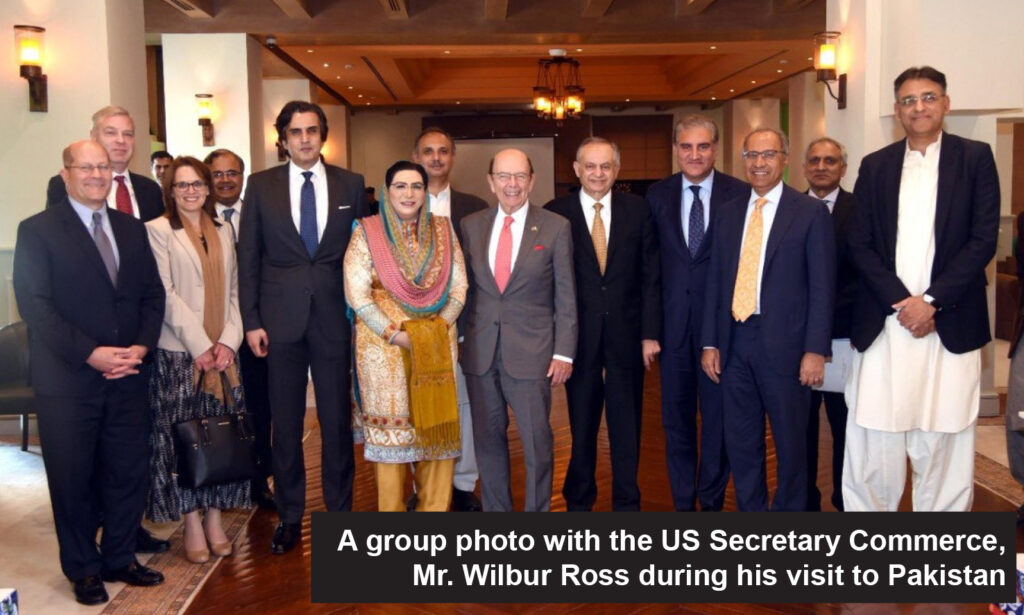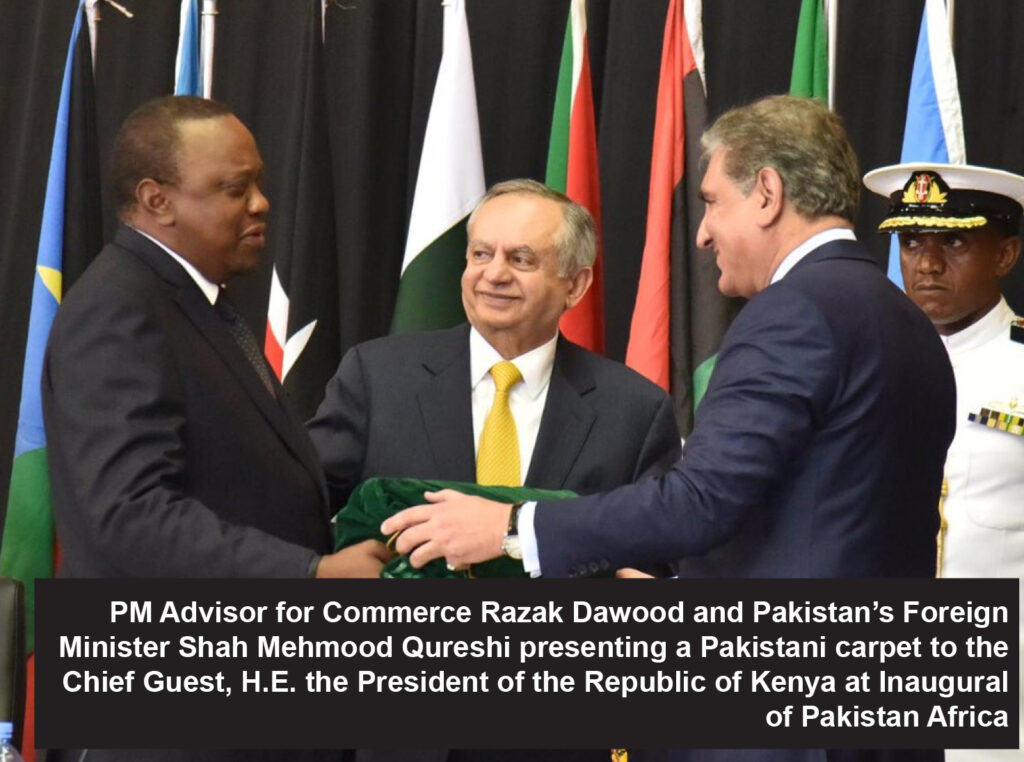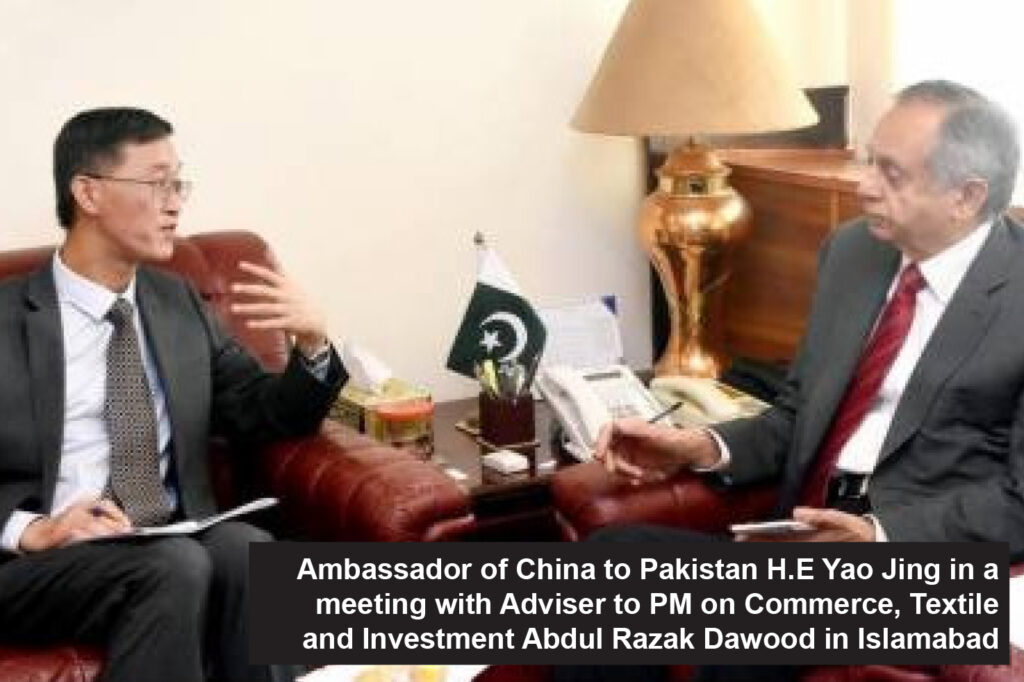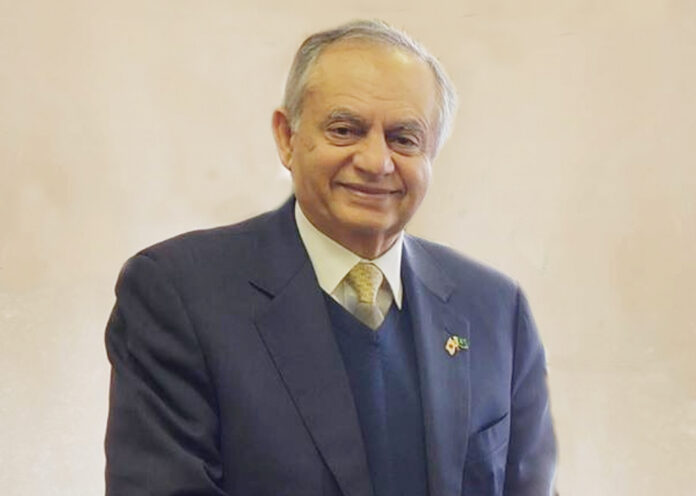A scion of one of Pakistan’s pioneering industrial families, the Dawood Group, and the founder of one of Pakistan’s largest engineering companies, Descon, Abdul Razak Dawood is currently serving in his second stint in the federal cabinet.
Both times the titan of industry turned politician has held the same portfolio, Federal Minister for Commerce. While his first term, under former military ruler President General (r) Pervez Musharraf, was served from a plush seat in parliament, his second one has come as an Advisor to the Prime Minister with the status of Federal Minister.
On both occasions, Dawood has been no stranger to controversy or murmurings of conflicts of interest. Just a month ago when the annual federal budget had been announced, Dawood had been under fire for a tax exemption granted to the Lahore University of Management Sciences (LUMS), of which he is Pro-Chancellor. Before this, back in January 2019, his company Descon won the Rs 309 billion bid for the construction of the Mohmand Dam.
While these incidents have reached far from conclusive ends, currently, the advisor to the PM does not seem to have them on his mind. As it should be, his mind is focused on dealing with the ongoing coronavirus pandemic that has rocked Pakistan and the world.
Like some already implemented mitigation measures, the Ministry of Commerce has also come forward to initiate some steps for countering the impact of the pandemic on the country’s external trade. Chief among the government and the ministry’s priorities has been the “Make in Pakistan,” policy, which is a bid to set up exports to the international market, particularly in the current challenging times.
The concept behind the policy is that after the pandemic ends, there will be economic opportunities ready for the taking, and Pakistan must be prepared. For this, the government is shoring up products and increasing production, in order to promote locally made products in global markets.
To talk about what the commerce ministry is doing, and what we can expect for the future, Abdul Razzak Dawwod sat down with Profit for an exclusive one-on-one interview.
Profit: The natural first step in the process of ‘Make in Pakistan’ was to allow imports of raw material with relaxed regulatory duties. What have you done in this regard?
Abdul Razzak Dawood: The government is working to reduce the regulatory duties (RDs), Customs Duties, (CD) and, additional Custom Duties (ACDs) on raw material in coming years. We have a plan to make RD, CDs zero from the existing 20 percent duties. Our aim is to prepare cheap products in Pakistan and export to the EU and other countries.
Additionally, under this program, the government has reduced the RD, and CD on more than 1000 tariff lines pertaining to raw material in the budget 2020-21. This will have immense benefits for our local industry.
Profit: There has been a tussle between the Ministry of Commerce and Federal Board of Revenue (FBR) over duties and tariff as the former thinks the duties and tariff imposed by the latter as major impediments in hurting exports. What do you say to this?
ARD: Unfortunately, successive governments kept focus on revenue and did not pay heed to export. The FBR collects 47 pc of revenue from customs. Compare this with our neighbouring country India, where only 28 pc of the revenue is collected from customs. Bangladesh is a similar story with 26 pc. Meanwhile more developed regions such as the EU get only 10% revenue share from customs.

Unlike Pakistan, these countries collected more from sales and income tax. I had raised this issue with the Prime Minister last year. It was exactly as a result of this conversation that the determining tariff is now under the domain of the commerce ministry instead of the FBR.
Profit: Since the ministry has been empowered to decide the tariff, how has it used this new power to bring down the cost of production? Has it been through reduction of the tariff?
ARD: Our team has been working on tariff rationalization policy since November 2019. Admittedly, the original aim had been to complete this process since before presenting the 2020-21 budget. However, we postponed it in the middle to complete more consultations required with stakeholders.
Profit: How has the pandemic affected the country’s exports and the resultant export policy? Has there been a major shift in the focus on exports?
ARD: We had estimated $42 billion in exports till 2024-25 before the pandemic. I was personally optimistic that the government will be able to reach our $25 billion target, as there was at least 14% growth in exports comparable to the first eight months of last fiscal year. .
However, after the pandemic hit, we believe that the export levels will have fallen to somewhere around $22 billion this year. Now that the budget has been presented, I will give a three year roadmap with regard to import and export.
Profit: Still, what has the government done up until now to boost exports?
ARD: We have taken various measures to boost exports such as the release of Rs97 billion to textile exporters in comparison to the Rs 68 billion previous governments released from 2009-10 to 2017-18 in support schemes for the textile sector.
The incumbent government can further release funds in the last month of the current fiscal year (June). We have already released Rs51bn to the export sector in this fiscal year.
Furthermore the prices of gas as well as RLNG have been rationalized at Rs786/mmbtu and $6.5/mmbtu for export oriented sectors. Besides, electricity has also been provided at reduced rates of 7.5 cent/Kws to export oriented sectors including textiles.
Other important measures taken for supporting the export sector included import of cotton through the Torkham Border, withdrawal of RD, customs duty and ACD on imported cotton with effect from January 15, 2020. The markup of long term financing facility has been continued at 5% to encourage installation of plants and machinery, similarly, the mark up on export finance scheme continued 3% to provide short term loans to the exporters.
The duty free import of textile machinery has also been continued. To give a more long term plan, the third textile policy for the period of 2020-25 has been prepared. The draft has already been circulated to all ministries concerned and this policy would provide a foreseeable future to the manufacturers and exporters.
Profit: One of the traditional complaints has been that even if Pakistan manages to ramp up its exports, we are simply exporting the wrong things. Shouldn’t we be focusing on diversifying?
ARD: Pakistan has been very dependent on a few sectors, and our scope is confined to textile, leather, rice, carpets and other such products. What we have to do is focus on and give importance to other sectors such as pharmaceutical, engineering, and meat as well as poultry, food, chemicals, and IT.
Part of the reason for our current situation is that our geographical spread is also very limited. We have been concentrating primarily on the western world, such as the USA and Europe, then on China, Japan and Korea. It is only after these that we think about Far East Asian markets such as Malaysia and Thailand. We never visited Latin America, Central America and Australia and now the big one, Africa, which is bigger than India in terms of population (over a billion people), and almost the size of China. This is geographically bigger than China. We need to focus the neglected regions as potential markets of our products.

Profit On that note, your ministry, under the umbrella of the ‘Look Africa Policy’, had arranged a three-day conference in Kenya in January this year to explore the African market. What was the outcome?
ARD: Our exports to Africa have increased by 10 percent during the past few years. The unfortunate part was that the mega event organised by Pakistan in Africa was held just before the Covid-19 pandemic really shook the world. When we returned back from Kenya, we witnessed cases of Covid in Wuhan, and all attention went in that direction. Soon the first cases of the virus were reported in Pakistan. Anyhow, soon this pandemic will end, and then we will again be able to focus on the potential market of Africa.
Profit: As announced last year, your government had managed to get the additional export facility of $1 billion in China, mainly targeting export of three items from Pakistan: sugar, cotton yarn and rice. However, the facility, which was aimed at reducing the trade imbalances, could not be availed fully. What was the reason? More importantly, are there chances for this special facility to continue?
ARD: Pakistan has exported 200,000 metric tonnes of rice, worth $86 million to Chia. Similarly, we have also exported 300,000 tonnes of sugar worth $117 million. The amount of cotton yarn was 500 tonnes, and without any tax. making up an overall export amount in excess of $700 million of these items exported to China during the current financial year.
As far as this facility between Pakistan and China continuing is concerned, you will have to wait and see. This could be possible after high level talks. The Prime Minister may need to go there and discuss the matter with their leadership. Apparently, this may not happen now.
Profit Talk to us about the export of Personal Protective Equipment (PPE) that the government has allowed. We have heard that your ministry is getting a good response from the EU, especially Italy and the Netherlands.
ARD: This is correct. Exporters are getting millions of dollars worth of import orders from different countries, and Pakistan will be able to export $500 million worth of masks, sanitizers, gloves, and gowns, in the coming months.
Profit: As mentioned, the export of PPE has recently been announced. However, there are reports that there could be a shortage of molasses, alcohol and related items in the coming months in Pakistan itself. Presently, the rate of 80-90% ethanol varies from Rs 1000 to Rs 4000. The availability of and supply of alcohol to hospital pharmacies at cheap rates has become a challenge. Does the export of such items at this juncture make sense? Would the export not cause a jump in prices of the items in the local market where the masks, sanitizers are being sold out at exorbitant rates?
ARD: We are not immune to the economic shocks caused by the Covid-19 crisis, and our exports are down. A lot of our garments’ and chemical manufacturing capacity is lying idle and people are losing jobs, which will ultimately increase social pressures.
We must remember that there is a lot of idle capacity available to take care of any shortage, which in my opinion is unlikely to arise. This is because, as we export, our capability to manufacture PPEs will increase, which will take care of any local shortage. As for alcohol, our current production is far more than what we require.
Exporting PPE will not only bring in foreign exchange, reduce import dependency, open up a new market for exports, but it will also create employment. If we don’t move in time, we will be left behind.
We are already late in this area and we have lost a lot of orders to India and Bangladesh. India has become the world’s second largest manufacturer of PPE (after China) within a short span, despite the fact that they also have a huge number of Covid-19 cases.
Out of abundant caution, the government has put in place a monitoring mechanism by forming a committee comprising myself, the Minister for Industries & Production, SAPM on Health and the Minister for Science & Technology. It will monitor the stock surplus of the PPEs on a fortnightly basis and, if required, it will recommend an immediate ban on export of specific PPE items. This will take care of not only the availability but also the untoward price escalations that you mentioned.
Profit: Karachi is the trade hub of Pakistan. Reportedly, the provincial government is not taking the required steps to support and facilitate the business community there. Chambers and trade bodies are complaining about the lack of facilities in Sindh. Is the federal government going to take any steps in this regard?
ARD: The Sindh government is in a tough situation as Karachi is a huge city. There have been restrictions with regard to opening of business. On the other hand, Punjab is a big province and people prefer to start work there. However, I have also been receiving complaints that the Punjab government is creating hurdles for investors. I will talk to the business community and government officials in Punjab about this, but effectively balancing these two things is not an easy task for any government/.
Profit: Your American counterpart, Wilbut Ross, visited Pakistan in February this year. Did that visit ever result in anything? Perhaps in some sort of old deal that was in the pipeline but never ended up happening?

ARD: Back in the Musharaff era, the Bush administration had given an idea to Pakistan and Afghanistan. This involved the two countries preparing different products and exporting them to America without any duty, however, this never came to fruition. This is similar to the arrangement made between Israel and Jordan. In the arrangement Jordan produces certain products with 25percent Israel content and exports to the US without any duty.
As the war like situation is still there in Afghanistan, no one can take the risk of investment in such an arrangement. In addition to this, a lot of discussion is also required with Americans and other stakeholders to set up industry in the merged areas of Khyber Pakhtunkhwa (KP). I cannot say that this is on the card or that this will be done in coming months.
Profit: As a prominent industrialist, how do you feel about the country’s economic outlook, and do you think your background gives you an edge over traditional politicians who usually run this ministry?
ARD: First and foremost, being a businessman gives me the distinct advantage of knowing the problems of the business community first-hand, as I myself have faced these problems at one point or the other. In business, the technocrats can persuade the markets by reputation, competence, and experience.
It is the right of the Prime Minister to decide what expertise he wants for a position in the cabinet, since he is the one that has to deliver the expectations of the people. He has to make it work in any way he deems fit. He is the captain of the ship, and therefore has the right to select the winning combination.
Also, being a businessman, I would like to think that it helps the government to bring in a mix of technocrats and parliamentarians in the cabinet. It creates a very diverse portfolio of expertise and experience.
Profit: When will Pakistan open its borders with neighboring countries for trade? The Pakistan China border at Khunjerab could not open after closure in December. China is reportedly not in favor of opening the border.
ARD: As you know, the Covid-19 situation in all the neighbouring countries of Pakistan is escalating, due to first or second waves of the pandemic. Hence, my ministry along with the ministries of interior and health are monitoring the situation and taking necessary measures. For example, we have allowed transit trade and exports to Afghanistan at Torkham and Chaman, subject to observance of SOPs to avoid Covid-19 spread. Iran has not been importing much from Pakistan for many years, however, as a gesture of goodwill, Pakistan has allowed imports from Iran especially for sustenance of border areas.
Profit: It seems that the process of reforms in the government institution has also been slowed down after the pandemic spread. As the World Bank may complete its survey for compiling Ease of Doing Business Index by October, where do you see Pakistan’s position in the next ranking?
ARD: We had done a lot of work before the Covid-19 crisis struck. However, I agree that since the crisis started, our efforts have received a slight setback. In my opinion, it is not fair to second-guess the World Bank at this stage. But I do hope that the World Bank takes into account difficulties brought in by the crisis, as ease of doing business is also affected by such externalities and force majeure events.










I think. He is most rich minister.
I really enjoyed reading this, you guys asked very nice questions!